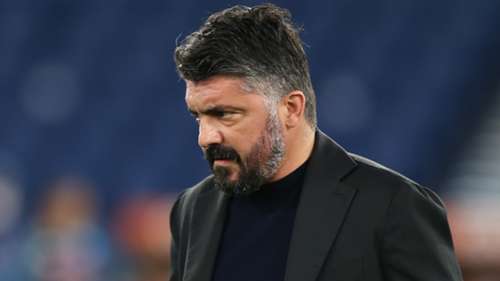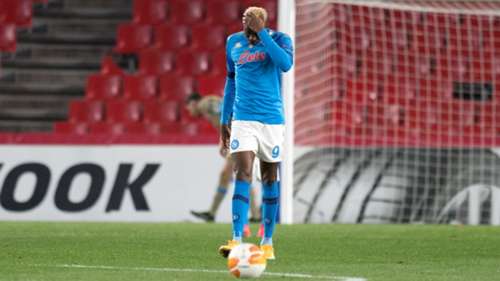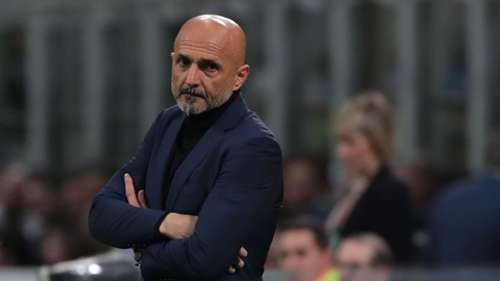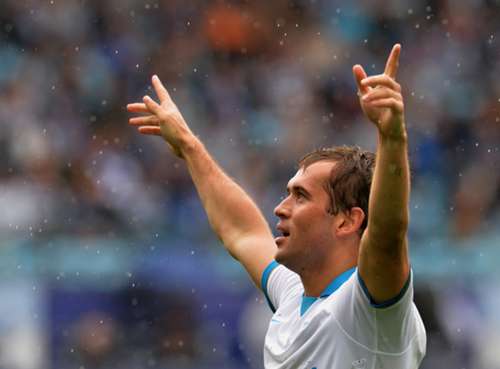[ad_1]
The former Roma and Internazionale boss has a history of bringing the best out of strikers, and he could be the making of Napoli’s Nigerian marksman
Napoli’s unfortunate stumble at the finish line in Serie A effectively put paid to the idea of Gennaro Gattuso continuing as manager.
The announcement of his departure came as a wrench to no one more than Victor Osimhen, who took to social media to serenade his former manager into the sunset.
The AC Milan legend, it will be remembered, championed the signing of the Nigeria international, and fought his corner several times as criticism of a stop-start season intensified.
Football, however, has little time for the touchy-feely.
On Saturday, the club announced the appointment of former Roma boss Luciano Spalletti, who has been out of work since being sacked by Inter in 2019.
He will be expected to get Napoli back into the Champions League for the first time in three years, while forging a clear tactical identity in a way Gattuso was unable to.
An unintended consequence of skyrocketing transfer fees is that, beyond merely getting results, managers are now judged on their ability to cater to high-priced assets.
The job brief now includes a part-time responsibility to essentially baby-sit – witness how, upon Frank Lampard’s sacking at Chelsea, part of the pitch for Thomas Tuchel to take over at Chelsea was that, being German, he would be better equipped to extract value from Timo Werner and Kai Havertz, both of whom had struggled to justify expensive outlays.
As such, another key performance index for Spalletti at Napoli will almost certainly be his ability to tap into Osimhen’s wellspring of ability and bring his potential bubbling to the surface.
While the 22-year-old certainly enjoyed the warmth and belief of Gattuso during the former AC Milan manager’s time at the helm at San Paolo, his debut season was more suggestive than definitive.
With his acclimation stunted by multiple injuries and two positive Covid-19 test results, Osimhen only really came into his own as a goalscorer in the season’s final throes.
While that late flurry was vital for his confidence (he eventually hit double figures), one can imagine he will not be granted the same allowances from the demanding Italian press and Napoli faithful if he does not hit the ground running.
He did, after all, cost a club – and African – record fee to acquire from Lille; more than Aurelio De Laurentiis sanctioned for the purchases of Edinson Cavani and Gonzalo Higuain, both of whom achieved legendary feats in Southern Italy before their departures.
Expecting a greater haul than 10 in Serie A is far from unreasonable.
Good thing then that Spalletti has, over the course of his career, been something of a striker-whisperer.
In his first spell as Roma boss, he revolutionized Italian football with a bold, ‘strikerless’ system that released club talisman Francesco Totti to have the best goalscoring season of his career. Er Pupone scored 26 goals to finish as capocannoniere in the 2006/07 season, and always won Europe’s Golden Shoe playing a nominal striker who was given license to start from deep.
At Zenit St Petersburg, Spalletti’s approach helped the returning Aleksandr Kerzhakov to 23 league goals in 2011/12.
The pair would eventually fall out, but it is instructive the Russian had never scored as much in a single league season before, and never did so again.
A second spell at Roma fired Edin Dzeko to 29 league goals (a career-best), before the Tuscan manager inspired Mauro Icardi to the same tally at Inter a season later – a career-best for the Argentina international as well.
What is perhaps most impressive about his success with centre-forwards is that these four forwards are stylistically quite different.
Totti, of course, was not a striker at all, but a silky, elegant creator who thrived between the lines; Kerzhakov was an explosive striker who played on the last line of opposing defences; Dzeko is a targetman who can also play with his feet; and Icardi is a foxy poacher inside the penalty area.
All different profiles, but all have flourished with Spalletti as coach.
On the basis of his record, if ever there was such a thing as a guarantee for taking strikers up a level or two, Spalletti is it. What’s more: it might very well be that this was a factor in De Laurentiis’ decision-making.
There is, however, an undercurrent of volatility.
His disagreements with Kerzhakov and Icardi stemmed from a perceived (in Spalletti’s view) lack of professionalism, and the Russian was at one point sent to train with the Zenit reserves.
He eventually fell out with Totti, grossly mishandling the Roma legend’s final playing season at the club, and there were frequent spats with Dzeko during the Bosnian’s record season.
The 62-year-old clearly can be a difficult personality sometimes.
He will perhaps lack the ability to connect on an emotional and personal level like Gattuso did – there will be fewer warm hugs for Osimhen on the touchline.
However, what the lanky striker will get is a manager who, according to Dzeko, “taught me new things.”
With his emphasis on technical play, his tactical flexibility and his ability to understand players’ strengths and play to them, Spalletti may be the manager that pulls the pin on Osimhen.
Watch for the ‘boom!’
[ad_2]



